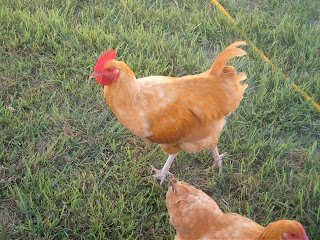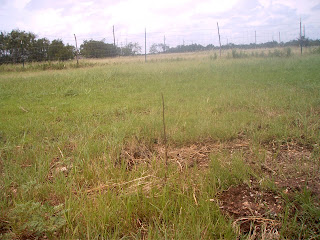The real answer is: it depends.
Here at Promised Land, we drink raw milk. The only time we drink pasturized, store-bought milk is when our cow is dry and we run out of raw. We find raw milk to be incredibly tasty and full of flavor. It is creamy, rich, and full and after drinking it for 3 months, pasturized milk (even whole) just tastes bland and dead. The term "chalk water" comes to mind.
We have all heard
about the dangers of raw milk and the praises of pasturized. In reading an article on the subject, I read one USDA official quoted as saying that feeding your kids raw milk is like giving them a ticking time bomb. What made that comment astounding was that this same official grew up drinking raw milk on a farm and never once got sick. So what's the truth?
Well, like I said before: it depends. If the cow is healthy, milking and processing practices are clean, and it is stored properly, raw milk is perfectly safe. In fact, raw milk is heathlier for you. Did you know there's good bacteria and bad bacteria out there? I ask because there are a lot of people out there that don't know some bacteria are good. We've been sort of brainwashed to fear bacteria, and super-sanitize everything. There are bad bacteria out there that we should guard against, but there's plenty of good bacteria we should appreciate. Our skin is covered with bacteria, both good and bad. The good bacteria actually protect us and keep the bad from taking over. If you were to kill all the good bacteria on your skin, the bad
would have a royal road in, and make you massively sick.
Well, these good bacteria are also present in our guts, and help us break down our food. The good bacteria in raw milk helps boost these good guys in our intestines and make us healthier. Raw milk is also full of good enzymes that are catalysts for all the processes in our cells. Pasturization kills these good bacteria and destroys these enzymes. Pasturized milk is still good for calories and calcium, but that's about it. Raw milk sours when the good and
bad bacteria grows to a high levels. A little souring is good, and makes butter, sour cream, and yogurt taste better. However, when milk is pasturized and all bacteria are killed, only the bad bacteria get back into the milk from the air, and the milk doesn't spoil...it turns rancid.
So if raw milk is so good, why does the government require the milk companies to pasturize it?
Well, the answer goes back to the 1800s. As people began moving off of farms, access to milk began decreasing. Some tried to ship it in from the country, but people got sick because it spoiled due to lack of refrigeration. People then tried setting up milking operations inside the city to get fresh milk to people faster. These were usually small lots in cities where cows were crammed together in unsanitary conditions, and would often develop fatal leg problems from standing on concrete all day. Not to mention, they were fed whatever was available, which was usually moldy grain or garbage from restaurants. Again, people got sick from unsanitary practices. Pasturization and refrigeration solved both these problems by killing all bacteria in the milk and helping it to last longer. Modern milk production and distrubution would not be possible without pasturization, so it's a good thing where needed.
However, if a person has access to raw milk that comes from a healthy cow, and is processed correctly, it is just as safe and even more healthy for you than pasturized. The best way to ensure these things is to raise and milk the cow yourself. Then there's no question. There are still some things to worry about. Brucellosis (undulant fever) is a disease spread by cows infected with brucella bacteria. Brucellosis can infect humans through raw milk and cause fever, sweating, weakness, headaches, and muscle aches. It is temporary, treated with antibiotics, and not fatal. It is also very rare in American dairy cattle. In fact, most states declare themselves brucellosis free. Texas recently lost that designation due to some cattle that got infected from Mexican cattle on the border, but there has not been a widespread outbreak in this state in decades. Cows can only get brucellosis from other cows. (Our cow is by herself in our pasture, and has no other cows around her in adjacent pastures.) Lastly, all dairy cattle are vaccinated for brucellosis annually as a preventitive measure. The risk is negligible. Most people that get sick from raw milk become ill due to common bacteria that get into the milk due to unsanitary milking and processing practices. Most farm families do not become sick, even from slightly spoiled milk because their bodies have built up immunities to the bacteria around the farm.
If you can get raw milk from someone you trust, I highly recommend it. Be prepared to pay a hefty price though. Organic raw milk can cost from $8-$13 per gallon. It is much cheaper to have your own cow. We probably pay the equivilant of what store-bought milk costs when all is said and done, so we get our raw milk at a significant discount. With milk prices heading up, we may actually end up saving money soon.















